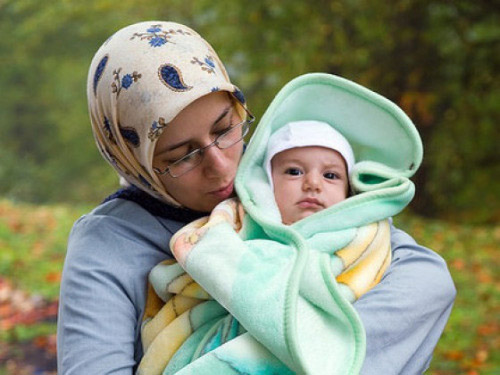Hats off to all mothers-to-be undertaking the fast during Ramadan.
According to a recent study, about three quarters of pregnant Muslim women worldwide choose to fast during Ramadan despite the clear flexibility they are given by Islamic sharia to decide not to fast.
The ultimate decision whether to fast or not lies between the mother-to-be and her physician.
If your physician clears you to fast, make sure you pamper yourself, as this will have a direct impact on your baby’s health.
Stay Happy: Pregnancy gives women a natural glow making them feel content and secure. So just carry on with this natural, positive approach, keep smiling and only fast for as long as it is comfortable and healthy.
Eat Healthily: Always remember that you need to eat for you and for your baby. Laziness and loss of appetite aren’t allowable excuses where the sohour and iftarmeals are concerned.
Incorporate healthy foods that release energy slowly such as whole grains, seeds, pulses, vegetables, dried fruits, nuts, well-cooked meat, green leafy vegetables, apricots and eggs.
Avoid sugary foods as they cause a rapid increase in blood glucose levels, resulting also in rapid drops in your sugar levels, making you feel dizzy.
At iftar (the sunset meal), avoid binging and instead eat small, frequent meals at regular intervals until sohour (the predawn meal).
Don’t Forget: Take nutritional supplements like iron, calcium, folic acid, minerals and other nutritious substances required during pregnancy after talking to your healthcare provider.
Be a Thirst Quencher: Include plenty of fluids in your diet, with the exception of caffeinated drinks, which increase the frequency of urination and lead to dehydration. Fluid restriction during the fast can also theoretically provoke uterine contractions.
Say No: You should emphatically say no to any kind of herbal products, excessive vitamin A and anything that contains alcohol.
Don’t Rush and Take It Easy: Pace yourself when it comes to your professional and household work and make sure you get as much rest as possible.
Excessive physical exertion can harm your pregnancy. Make sure you lead a balanced lifestyle. Physical activity is healthy within limits of course.
Sitting and lying down all the time can also lead to lethargy and can also lead to deep vein thromboses.
You Deserve a Break: If fasting makes you feel continuously lethargic, you can opt to fast on alternate days or you can make up your fast after Ramadan and once you’ve delivered, as Islamic shari’ah allows.
Have a discussion with your physician about your susceptibility to a high-risk pregnancy, your previous illnesses, whether you have a history of miscarriages or twin pregnancies, and how this being your first pregnancy or more might affect your fasting.
Also be aware that food deprivation in the first trimester of pregnancy increases the risk of pre-term delivery, whereas third trimester nutritional stress is associated with low birth weights.
Fasting while pregnant can lead to low blood sugar levels, increased levels of blood ketone bodies due to fat breakdown, dehydration, increased uterine contractions, decreased fetal movements, fatigue and blurring of vision. If you notice any kind of bleeding or severe nausea and vomiting, rush to your doctor.
A 2012 study reported that some pregnant women who fast during Ramadan are likely to have smaller babies who are prone to learning disabilities as they grow older.
On the other hand, a 2010 study found that fasting in mothers between 25 and 35 years old who enjoyed an appropriate body mass index and who had no illnesses didn’t have an effect on the weight, height and head circumference of their babies.
Mothers who fasted in the first trimester, however, were found to be 1.5 times more likely to give birth to low-birth-weight babies compared to non-fasting mothers.
The Best Judge: In the end, you know what’s best for you and for your baby. Use common sense and decide whether fasting is the right choice for you. Mothers are great decision-makers. So good luck and best wishes to all moms! And remember, “A child gives birth to a mother.”
This article is from Science’s archive and we’ve originally published it on an earlier date.
References:
- M. Z. A. Nomani. Diet during Ramadan. Journal of Ramadan Fasting Research. June 8, 2015.
- Almond D, Mazumder B. 2010. Health Capital and the Prenatal Environment: The Effect of Maternal Fasting During Pregnancy. Accessed January 2011:www.chicagofed.org
- Arab M, Nasrollahi S. 2001. Interrelation of Ramadan fasting and birth weight. Vol. 14, No. 3. Hamadan Iran. Medical Journal of Islamic Academy of Sciences. Accessed July 2009: www.medicaljournal-ias.org
- Azizi F, Sadeghipour H, Siahkolah B et al. 2004. Intellectual development of children born of mothers who fasted in Ramadan during pregnancy. International journal for vitamin and nutrition research. 74 (5): 374-380. [Accessed July 2009].
- Umm Maryam. Tips for Healthy Fasting for pregnant & lactating Muslimahs. September 15, 2007.
- Shaykh Muhammad Saalih al-Munajjid. Islam Questions and Answers. June 23, 2015.
- Sarah Zadok. Top Ten Fasting Tips for Pregnant Woman. June 23, 2015.
- Raul Artal. Risks Factors for Complications During Pregnancy. March 2013.
- British Nutrition Foundation: Nutrition and supplements during pregnancy.
- Domnique Soguel. Ramadan Feeds Mixed Views on Maternal Fasts. October 2, 2007.
